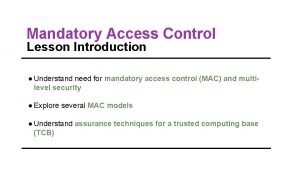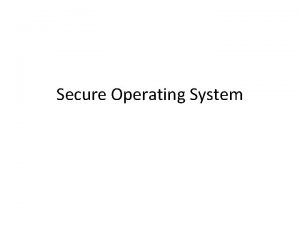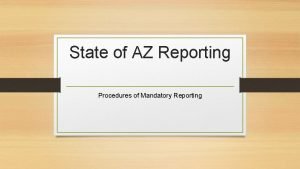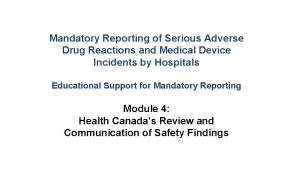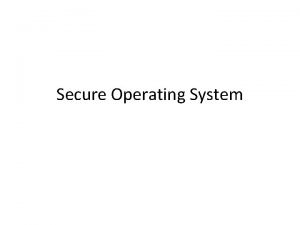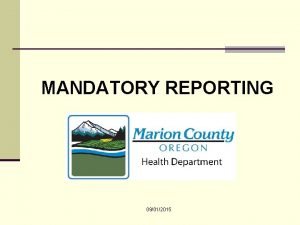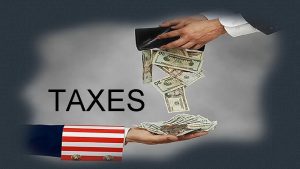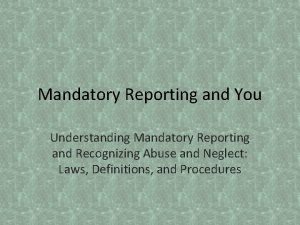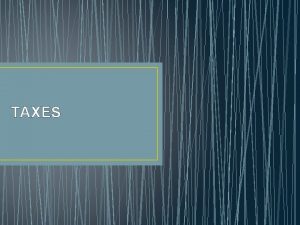Taxes 1 What are Taxes Taxes mandatory payments


















- Slides: 18

Taxes 1


What are Taxes? Taxes – mandatory payments made to the government to cover costs of governing. Why does the government tax? Two purposes: 1. Finance government operations. • Public goods-highways, defense, employee wages • Fund Programs- welfare, social security 2. Influence economic behavior of firms and individuals. Ex: Excise taxes on tobacco raises tax revenue and discourages the use of cigarettes. 3

Criteria for Effective Taxes: 1. Equity or Fairness Most people feel that taxes have to be impartial and just to be fair. Some people believe that equal=fair 2. Simplicity • Tax laws should be written so that both the taxpayer and the tax collector can understand them. 3. Efficiency • A tax should be relatively easy to administer and reasonably successful at generating revenue 4

TAXES AND EQUITY • Principles of Taxation – Benefits principle – Ability-to-pay principle $

• The benefits principle is the idea that people Benefits Principle should pay taxes based on the benefits they receive from government services. • An example is a gasoline tax: – Tax revenues from a gasoline tax are used to finance our highway system. – People who drive the most also pay the most toward maintaining roads.

• Ability-to-Pay Principle The ability-to-pay principle is the idea that taxes should be levied on a person according to how well that person can shoulder the burden.



Economic Impact of Taxes 1. Resource Re-allocation Tax placed on a good or service can raise the cost of production and the price of the good. Ex: 1991 Luxury Tax 2. Behavior adjustment • Taxes are used to encourage or discourage certain types of activities • Ex: Smoking; Gasoline consumption 3. Productivity and Growth • Change incentives to save, invest, and work • Ex: People may not want to work to earn additional income it if will be taxed away 10

Three Types of Taxes 1. Progressive Taxes -takes a larger percent of income from high income groups (takes more from rich people). Ex: Current Federal Income Tax system 2. Proportional Taxes (flat rate) –takes the same percent of income from all income groups. Ex: 20% flat income tax on all income groups 3. Regressive Taxes –takes a larger percentage from low income groups (takes more from poor people). Ex: Sales tax; any consumption tax. 11

What kind of taxes are these? (THINK % of Income) 1. Toll road tax ($1 per day) 2. State income tax where richer citizens pay higher % 3. $1. 45 tax on cigarettes 4. Medicare tax of 1% of every dollar earned 5. 8. 75% California sales tax 12

Federal Income Tax Debate Equal Tax of $350 per week (Regressive Tax) Income Amount of Tax % Amount to live on • $200 $350 175% -$150)[crime? ] • $350 100% $0 • $500 $350 70% $150 • $1, 000 $350 35% $650 • $5, 000 $350 7% $4, 650 Tax of 20% per week (Proportional Tax) Income Amount of Tax Amount to live on • $200 $40 $160 • $350 $70 $280 • $500 $100 $400 • $1, 000 $200 $800 • $5, 000 $1, 000 $4, 000 13

Federal Income Tax Debate This is our current system. Is it fair?

Sources of Government Revenue: 1. Individual Income Tax: State and Federal; Higher income levels pay higher amount of tax (progressive) 2. Payroll taxes: Tax on wages that firms pay their workers (social security, medicare) 3. Excise Taxes: Taxes on the sale of specific goods such as cigarettes, gasoline, alcohol. 4. Property Taxes: Tax on land improvements 5. Estate taxes: Tax on transfer of the estate of a deceased person 6. Corporate Income Tax: Taxes paid by businesses that are structured as corporations (in addition to personal taxes paid by the people that work there or receive dividends) 7. Customs Duties: Taxes paid on goods that are imported 15 or exported

Receipts of the Federal Government. . . Individual Income Tax, 47% Social Insurance Tax, 34% Corporate Tax, 10% Other, 9%

U. S. Federal Receipts - 2012 The Obama administration's February 2012 budget request contained $2. 902 trillion in receipts and $3. 803 trillion in outlays, for a deficit of $901 billion Total receipts (in billions of dollars): Item Requested Individual income tax 1, 359 Social Security and other payroll tax 959 Corporate income tax 348 Excise tax 88 Customs duties 33 Estate and gift taxes 13 Deposits of earnings and Federal Reserve System 80 Other miscellaneous receipts 21 Total 2902

Budget Expenditures. . .
 Antigentest åre
Antigentest åre Performance based payments
Performance based payments Mandatory access control (mac)
Mandatory access control (mac) Tn mandatory reporting laws
Tn mandatory reporting laws Mandatory product adaptation
Mandatory product adaptation Mandatory protection system
Mandatory protection system Mandatory reporting procedures
Mandatory reporting procedures Mandatory reporting
Mandatory reporting Criteria for prioritizing learning needs
Criteria for prioritizing learning needs Little league mandatory play rule
Little league mandatory play rule Virginia mandatory reporting law domestic violence
Virginia mandatory reporting law domestic violence What is a mandatory reporter
What is a mandatory reporter Mandatory vaccination
Mandatory vaccination Bgp attributes
Bgp attributes 250000000/20000
250000000/20000 Is usp 800 mandatory
Is usp 800 mandatory Mandatory rules examples
Mandatory rules examples Mandatory protection system
Mandatory protection system Mandatory meeting notice
Mandatory meeting notice


